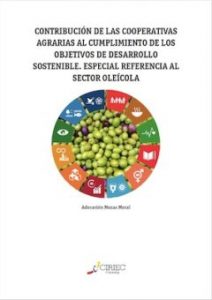Groupe de travail inter-agences des Nations Unies sur l’Économie sociale et solidaire (UNTFSSE)
Le groupe de travail Inter-agences des Nations Unies sur l’Économie sociale et solidaire (TFSSE) a pour objectif d’accroître la visibilité des débats sur l’économie sociale et solidaire au sein du système des Nations Unies et au-delà. Les membres et observateurs du groupe de travail se sont engagés à entreprendre des activités en collaboration pour:
- renforcer la reconnaissance du rôle des entreprises et des organisations de l’ESS dans le développement durable;
- promouvoir la connaissance de l’ESS et consolider ses réseaux;
- soutenir la création d’un environnement institutionnel et politique favorable à l’ESS;
- assurer la coordination des efforts internationaux, créer et renforcer des partenariats.
Le travail de la Task Force prend la forme d‘initiatives conjointes entre les membres: rédaction de rapports et de briefings, organisation d’événements liés à l’ESS en lien avec les processus et conférences des Nations Unies, et création de partenariats et de dialogues avec des entités gouvernementales et de la société civile.
Le CIRIEC est l’un des observateurs de la Task Force depuis octobre 2018. D’autres membres et observateurs.
Plus d’informations sur Groupe de travail inter-agences des Nations Unies sur l’Économie sociale et solidaire (UNTFSSE) ICI
Publications:
- WORKING PAPERS:
-
- Producing Statistics on Social and Solidarity Economy: The State of the Art / Marie J. Bouchard, Gabriel Salathé-Beaulieu, 2021
- Mapping International SSE Mapping Exercises / Coline Compère, Barbara Sak, Jérôme Schoenmaeckers, 2021
- Producing Statistics on Social and Solidarity Economy: Policy Recommendations and Directions for Future Research / Rafael Chaves-Avila, 2021
- ENCYCLOPEDIA OF THE SOCIAL AND SOLIDARITY ECONOMY – A Collective Work of the United Nations Inter-Agency Task Force on SSE (UNTFSSE)
Edited by Ilcheong Yi, United Nations Research Institute for Social Development (UNRISD), Switzerland, et al.
L’encyclopédie est accessible sur le site de l’UNTFSSE – Knowledge Hub & Edward Elgar Companion Website. 57 entrées, dont 15 ont été écrites par des membres dur CIRIEC, sont librement accessibles:
-
- Origins and histories of the social and solidarity economy
- Contemporary Understandings of the Social and Solidarity Economy
- Postcolonial Theories and the Social and Solidarity Economy
- Globalization, Alter-globalization and the Social and Solidarity Economy
- Moral Economy, Human Economy, and the Social and Solidarity Economy
- Feminist Economics and the Social and Solidarity Economy
- Community Economics and the Social and Solidarity Economy
- Ecological Economics and the Social and Solidarity Economy
- The Commons and the Social and Solidarity Economy
- The Black Social Economy and the Social and Solidarity Economy
- Indigenous Economies and the Social and Solidarity Economy
- Heterodox Economics and the Social and Solidarity Economy
- Activism, Social Movements and the Social and Solidarity Economy
- Cooperatives and Mutuals
- Associations and Associationalism
- Non-Governmental Organizations and Foundations
- Social Enterprises
- Women’s Self-Help Groups
- Community-Based Organizations
- African American Social and Solidarity Economy and Distributive Justice
- LGBTQ+ Inclusion and the Social and Solidarity Economy
- Youth and the Social and Solidarity Economy
- Migrants, Refugees and the Social and Solidarity Economy
- The Sustainable Development Goals and the Social and Solidarity Economy
- Work Integration and Social Enterprises
- Sustainable Investment, Production, Consumption and the Social and Solidarity Economy
- Peace, Non-Violence, and the Social and Solidarity Economy
- Reduction of Hunger and Poverty and the Social and Solidarity Economy
- Reduction of Multi-dimensional Inequalities and the Social and Solidarity Economy
- Care and Home Support Services and the Social and Solidarity Economy
- Local Community Development and the Social and Solidarity Economy
- Gender Equality and Empowerment in the Social and Solidarity Economy
- The Food and Agriculture Sector and the Social and Solidarity Economy
- The Finance Sector and the Social and Solidarity Economy
- The Housing Sector and the Social and Solidarity Economy
- Energy, Water and Waste Management Sectors and the Social and Solidarity Economy
- Tourism Sector and the Social and Solidarity Economy
- Social Services and the Social and Solidarity Economy
- Information and Communication Technology (ICT) and the Social and Solidarity Economy
- Culture, Sports and Leisure Sectors and the Social and Solidarity Economy
- Education Sector and the Social and Solidarity Economy
- Health and Care Sector and the Social and Solidarity Economy
- The Institutional Ecosystem of the Social and Solidarity Economy
- Public Policy and the Social and Solidarity Economy
- Social Policy and the Social and Solidarity Economy
- Social and Solidarity Economy and Co-optation, Isomorphism, and Instrumentalisation
- Supporting Organizations and Intermediaries for Social and Solidarity Economy
- Legal Frameworks and Laws for the Social and Solidarity Economy
- Local and Territorial Development Plans and the Social and Solidarity Economy
- Partnership and Co-construction and the Social and Solidarity Economy
- Statistical Measurement of the Social and Solidarity Economy
- Access to Markets for the Social and Solidarity Economy
- Financing for the Social and Solidarity Economy
- Participation, Governance, Collective Action, Democracy and the Social and Solidarity Economy
- Social and Solidarity Economy and Resilience in the Context of Multiple Crises
- Working Conditions and Wages in the Social and Solidarity Economy
- Management of Social and Solidarity Economy Organizations and Enterprises
L’UNRISD a instauré un Comité consultatif composé de deux membres et deux observateurs de la UNTFSSE. Le CIRIEC a été sélectionné (2020-22) pour sa compétence et ses contributions aux activités du Knowledge Hub ainsi que sa capacité à exploiter son réseau pour contribuer à la dissémination.
Le Knowledge Hub gère actuellement 2 projets :
- L’Encyclopédie ESS vise à fournir aux décideurs politiques et aux chercheurs-es un outil de référence complet sur l’économie sociale et solidaire (ESS). Barbara Sak, représentant le CIRIEC international, a été nommée au Comité éditorial.
Un appel à contributions pour ce projet Encyclopédie ESS sera annoncé à l’automne 2020.- 1ère réunion (9 juillet 2020): compte-rendu ICI
- La Cartographie de données et de statistiques méthodiques sur l’ESS est coordonnée par Marie J. Bouchard avec la participation active de Rafael Chaves et du secrétariat du CIRIEC (y compris son Centre de Documentation basé à Liège). Suite à l’Atelier d’experts en novembre 2019, 3 Working Papers seront produits d’ici la fin 2020.
AOÛT 2021 : 3 Nouveaux UNTFSSE Working Papers par des auteurs CIRIEC en FREE ACCESS
Ces publications seront présentées lors de la 8ème CONFÉRENCE INTERNATIONALE DE RECHERCHE EN ECONOMIE SOCIALE à San José (COSTA RICA) du 08 au 10 Septembre 2021.
- Producing Statistics on Social and Solidarity Economy: The State of the Art / Marie J. Bouchard, Gabriel Salathé-Beaulieu, 2021
- Mapping International SSE Mapping Exercises / Coline Compère, Barbara Sak, Jérôme Schoenmaeckers, 2021
- Producing Statistics on Social and Solidarity Economy: Policy Recommendations and Directions for Future Research / Rafael Chaves-Avila, 2021
IMPLEMENTING THE SUSTAINABLE DEVELOPMENT GOALS
What Role for Social and Solidarity Economy?
This event was part of a series of conferences resulting from the Call for Papers « Implementing the Sustainable Development Goals: What Role for Social and Solidarity Economy? » which was launched by UNRISD in 2018 and co-organized with the United Nations Inter-Agency Task Force on Social and Solidarity Economy (UNTFSSE) .
Identify and mobilize research from different regions and territories by critically examining the role of SSE in implementing SDGs is the objective.
SPECIAL SESSION organized by CIRIEC, ICA (International Cooperative Alliance), and SSE Forum International
SSE IMPACTS FOR THE SDGs:
Examples from India, Brazil and Spain
(Geneva, 25 June 2019)
Moderator: Alain Arnaud, President, CIRIEC (Introduction in EN & FR)
- REEMA NANAVATY, General Secretary, SEWA – The Self Employed Women’s Association (SEWA) in India (Presentation + Nanavaty Presentation + SPEECH)
- LEANDRO MORAIS, Professor and Researcher, Universidade Estadual Paulista, Brazil – The Maranhão State Reference Center for Solidarity Economy (CRESOL): State Government and SSE Entrepreneurs Joining Forces in Brazil (Presentation)
- ADORACIÓN MOZ
 AS, Professor, University of Jaén; President of CIRIEC-España – How Agricultural Cooperatives Achieve the SDGs (Presentation + the book CONTRIBUCIÓN DE LAS COOPERATIVAS AGRARIAS AL CUMPLIMIENTO DE LOS OBJETIVOS DE DESARROLLO SOSTENIBLE. ESPECIAL REFERENCIA AL SECTOR OLEÍCOLA)
AS, Professor, University of Jaén; President of CIRIEC-España – How Agricultural Cooperatives Achieve the SDGs (Presentation + the book CONTRIBUCIÓN DE LAS COOPERATIVAS AGRARIAS AL CUMPLIMIENTO DE LOS OBJETIVOS DE DESARROLLO SOSTENIBLE. ESPECIAL REFERENCIA AL SECTOR OLEÍCOLA) - Discussants: ARIEL GUARCO, President, ICA & ALAIN COHEUR, Co-President, SSE Forum International
- WORKING PAPERS of the conference HERE
- More info here


